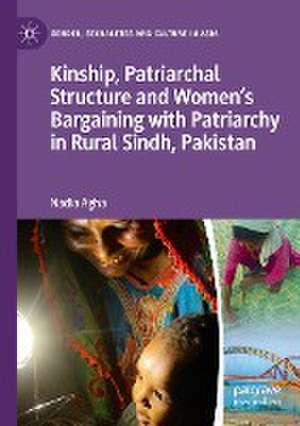Kinship, Patriarchal Structure and Women’s Bargaining with Patriarchy in Rural Sindh, Pakistan: Gender, Sexualities and Culture in Asia
Autor Nadia Aghaen Limba Engleză Paperback – 2 dec 2022
| Toate formatele și edițiile | Preț | Express |
|---|---|---|
| Paperback (1) | 724.32 lei 6-8 săpt. | |
| Springer Nature Singapore – 2 dec 2022 | 724.32 lei 6-8 săpt. | |
| Hardback (1) | 730.79 lei 6-8 săpt. | |
| Springer Nature Singapore – dec 2021 | 730.79 lei 6-8 săpt. |
Preț: 724.32 lei
Preț vechi: 883.31 lei
-18% Nou
Puncte Express: 1086
Preț estimativ în valută:
138.63€ • 144.19$ • 116.18£
138.63€ • 144.19$ • 116.18£
Carte tipărită la comandă
Livrare economică 13-27 martie
Preluare comenzi: 021 569.72.76
Specificații
ISBN-13: 9789811668616
ISBN-10: 9811668612
Pagini: 273
Ilustrații: XVII, 273 p. 18 illus.
Dimensiuni: 148 x 210 mm
Greutate: 0.35 kg
Ediția:1st ed. 2021
Editura: Springer Nature Singapore
Colecția Palgrave Macmillan
Seria Gender, Sexualities and Culture in Asia
Locul publicării:Singapore, Singapore
ISBN-10: 9811668612
Pagini: 273
Ilustrații: XVII, 273 p. 18 illus.
Dimensiuni: 148 x 210 mm
Greutate: 0.35 kg
Ediția:1st ed. 2021
Editura: Springer Nature Singapore
Colecția Palgrave Macmillan
Seria Gender, Sexualities and Culture in Asia
Locul publicării:Singapore, Singapore
Cuprins
Chapter 1: Introduction.- Chapter 2: Rural Pakistani Women in Context: Patriarchy and Poverty.- Chapter 3: Exploring Rural Women’s Lives: Methodological Choices and Challenges.- Chapter 4: Kinship in Rural Sindh: Forms of Marriage and Their Consequences for Women.- Chapter 5: Household Work: Exploitation and Negotiation.- Chapter 6: Household Power Structure and Women’s Negotiation with Patriarchy.- Chapter 7: Women’s Negotiation and Bargaining with Patriarchy: A Game of Patience.- Chapter 8: Conclusion.
Notă biografică
Dr. Nadia Agha is Associate Professor in Sociology at Shah Abdul Latif University, Khairpur, Pakistan. She has a doctorate in Women’s Studies from the University of York, England. Her recent work has been published in the Asian Journal of Social Science, Journal of Research in Gender Studies, Health Education and Journal of International Women’s Studies.
Textul de pe ultima copertă
Elaborating on gendered power relations in a little-known area of Pakistan, Nadia Agha explores how women in the cultural context of Khairpur actively participate in mitigating their own subordination by ‘playing by the cultural rules’ and hence ensure their economic survival. As poverty and social insecurity are at the foundation of why women must acquiesce to patriarchal control, she shows how they often adopt survival strategies to enable their agency to gain societal approval within prevailing strict patriarchal boundaries. Professor Agha deftly shows that when women make choices to accommodate others, this is often actually a strategy they can use to gain some semblance of power. This is an important contribution to our understanding of choices women make within patriarchy in South Asia and how they can eke out some power by doing so.
Professor Anita M. Weiss, International Studies, University of Oregon, Author of Interpreting Islam, Modernity and Women’s Rights in Pakistan (Palgrave Macmillan, 2014) and Countering Violent Extremism in Pakistan: Local Actions, Local Voices (Oxford University Press, 2020)
Professor Anita M. Weiss, International Studies, University of Oregon, Author of Interpreting Islam, Modernity and Women’s Rights in Pakistan (Palgrave Macmillan, 2014) and Countering Violent Extremism in Pakistan: Local Actions, Local Voices (Oxford University Press, 2020)
The book provides insights into the prevailing patriarchal system in rural Pakistan. It elaborates on the kinship system in rural Sindh and explores how young married women strategize and negotiate with patriarchy. Drawing on qualitative methodologies, the book reveals the strong relationship between poverty and the perpetuation of patriarchy. Women’s strategies help elevate their position in their families, such as attention to household tasks, producing children, and doing handicraft work for their well-being. These conditions are usually seen as evidence of women’s subordination, but these are also strategies for survival where accommodation to patriarchy wins them approval. The book concludes that women’s life-long struggle is, in fact, a technique of negotiating withpatriarchy. In so doing, they internalize the culture that rests on their subordination and reproduce it in older age in exercising power by oppressing other junior women.
Dr. Nadia Agha is Associate Professor in Sociology at Shah Abdul Latif University, Khairpur, Pakistan. She has a doctorate in Women’s Studies from the University of York, England. Her recent work has been published in the Asian Journal of Social Science, Journal of Research in Gender Studies, Health Education and Journal of International Women’s Studies.
Caracteristici
Fills the gap on kinship system in rural Pakistan Explains why endogamous marriages are so common and result in early marriage Explores why despite several interventions, women’s status has seen very little improvements in Pakistan









